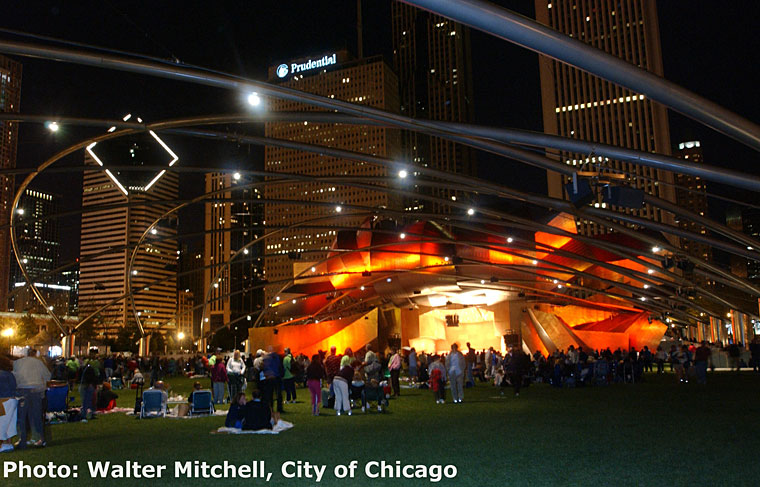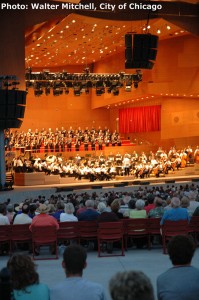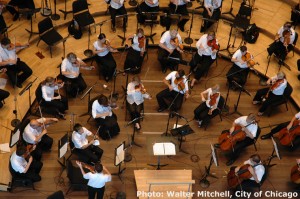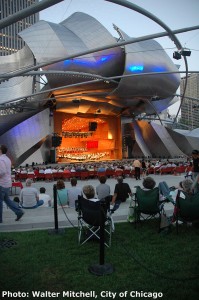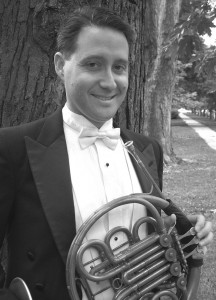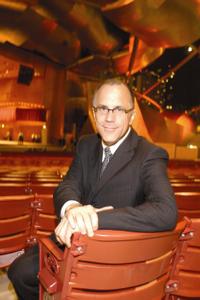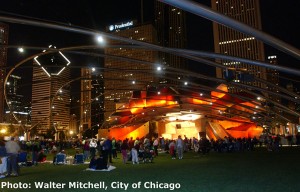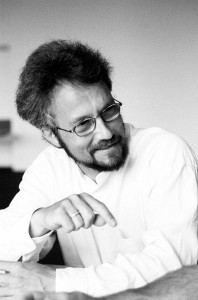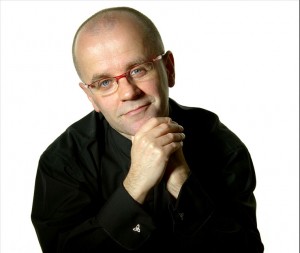Grant Park Symphony Orchestra
About The Ensemble
Among the professional level orchestras throughout the United States, perhaps none is as unique as the Grant Park Symphony Orchestra (GPSO). The Grant Park Music Festival (GPMF) was initially conceived by Chicago Mayor A. J. Cermak during the Great Depression in 1931 when the city presented a series of free concerts to lift the spirits of Chicagoans. The following year, James C. Petrillo, the president of the Chicago Federation of Musicians, vigorously labored to turn these concerts into a permanent summer tradition. Petrillo’s motives were twofold: to make classical music available for all Chicagoans, and to provide secure employment for union musicians.
75 years later, those efforts have endured as the GPSO is the only summer festival ensemble that is a member of the International Conference of Symphony and Opera Musicians, a conference of the American Federation of Musicians. As of the 2006 concert season, the ensemble has a 10 week season and offers a base salary of $10,377, plus and additional $650.00 for health and welfare, as well as a $950.00 Electronic Media Guarantee.
In addition to the 82 regular orchestra musicians, the festival also maintains a 100 member paid, professional chorus under the leadership of a dedicated chorus director. Since 2001, the Festival has been presented through a unique collaboration of the Chicago Park District, the Chicago Department of Cultural Affairs and the Grant Park Orchestral Association. The Grant Park Orchestral Association is a nonprofit organization dedicated to supporting the Festival’s programs and priorities. The Grant Park Orchestra and Chorus reach over one million people annually through free classical music performances and the Festival’s extensive community engagement program brings music education to young people from across the city each summer.
In 2004, the Festival moved to its new home in the Jay Pritzker Pavilion in Millennium Park. This state-of-the-art music pavilion was designed by internationally renowned architect Frank Gehry and features an unparalleled acoustic system created by the Talaske Group, Inc. of Oak Park, IL. The first permanent outdoor installation of its kind in the United States, the Pavilion’s sound system features digitally processed “virtual architecture” and an open-air acoustical canopy to create a state-of-the-art sonic experience.
The Grant Park Symphony Orchestra carries the unique distinction of being the only professional orchestral ensemble in the United States whose annual budget is subsidized by the government by at least 50%. In essence, the GPSO is the closest thing to a state sponsored ensemble in the U.S. As such, The Grant Park Music Festival is the nation’s only remaining free, outdoor classical music series.
June 2006
Interview with Neil Kimel, Orchestra Committee Member
GPMF Second Horn Neil Kimel began playing with the ensemble as a regular member in 2000. He currently serves as elected member of the ensemble’s orchestra committee as well as the liaison between the orchestra and artistic committees.
Polyphonic.org Senior Editor & Research Principal, Drew McManus, spoke with Neil over the telephone about how the musicians participate in charting the organization’s artistic future.
Drew McManus: What impact do the players have on the artistic direction of the organization?
Neil Kimel: The players have an artistic committee as well as an orchestra committee and I serve as the liaison between the two committees. We do hand out surveys to the players to get their feedback regarding many aspects of the season and our working conditions. The biggest challenge of the job and a big point of contention for many players is a diversity of our repertoire. We have at most only 3 services to prepare any given program even if it contains a large work that most of the orchestra has never performed. Performing two programs a week makes rehearsal time fast and furious, but we still manage to deliver high level performances and recordings. Jim Palermo [GPMF Artistic & General Director] is also quite receptive to repertoire ideas from the players of the orchestra.
Personally, one of my favorite things about the festival is that we program lesser known works, even lesser known works by well known composers. In past years, we have done surveys of the music of Robert Kurka and John Corligiano as well as the more obscure Erich Korngold Symphony in F#, an Orchestral Suite by Dohnanyi, and Shostakovich’s rarely played Symphony #6 just to name a few. This season we can look forward to exploring David Diamond’s 4th Symphony, Dvorak’s Stabat Mater, and Aaron Kernis’s Symphony in Waves. For me it is really thrilling to gaze out from the stage to behold a sea of 8,000 people or more awaiting live music and not just filling the seats and lawn for concerts containing the ubiquitous music Beethoven, Mozart, or Brahms.
Drew McManus: What sort of issues do you poll the musicians about in surveys?
Neil Kimel: The surveys cover mostly opinions on contractual topics such as base salary, pension contribution percentage, working conditions, recording sessions, work load, scheduling, and topics such as these.
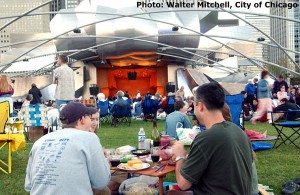
The Jay Pritzker Pavilion stands 120-feet high & accommodates 11,000 patrons (4,000 fixed & 7,000 lawn).
Drew McManus: How has the opening of Millennium Park made the players think about where the organization is headed?
Neil Kimel: As an orchestra, we are definitely at a higher profile in the city due to the huge success and appeal of Millennium Park and Frank Gehry’s Pritzker Pavilion. We hope the park draws more Chicagoans and tourists alike to experience music outdoors like never before. Our recordings are receiving critical acclaim and one was even nominated for a Grammy Award. In general, there is a great deal more pride among the players since the park opened up and I think it has shown in our attitudes.
Drew McManus: Do auditions and committee service function differently at Grant Park than other AFM represented ensembles?
Neil Kimel: One unusual difference is that we are a festival orchestra. As a result, a third or so of our members are spread throughout the country, so when we elect our negotiation and audition committees, we prefer that representatives be [Chicagoland] locals. However, we will sometimes fly a principal player in for a particular audition.
None of this is in the contract; it is just something that has evolved in this way. During our orchestra meetings in the summer we ask for [committee] volunteers and take nominations. During contract negotiations, we rely a great deal on legal council and our Local union representation to offer support since we are a unique organization. Along those lines, since we’re also Chicago Park District employees we have some unique issues which are different than a traditional ensemble. As such, having the support from those other individuals is a great help.
Our auditions work much like they do anywhere else except we have our Artistic & General Director participate in the audition process in lieu of the Music Director at the final round. In special cases such as the most recent concertmaster audition, our principal conductor, Carlos Kalmar, was indeed present. We don’t take an official vote at the final rounds we just worked on a level of consensus, but in the screened preliminary round, it is one vote for every audition committee member to advance the candidate or not. If the candidate receives a majority of “yes” votes to advance, he or she advances. [Editor’s Note, according to the Grant Park Symphony contract, “Upon request of either the principal player of the section in which there is a vacancy or the General Director/Artistic Director, any applicant determined to be unqualified by the Audition Committee in the preliminary auditions shall be immediately reheard and reconsidered… The principal player of the section in which there is a vacancy and the General Director/Artistic Director shall determine who, if anyone, will fill the vacancy… In the event there is a tie vote, in connection with any vacancy, the General Director/Artistic Director’s vote shall take priority”].
Interview with James W. Palermo, Artistic & General Director
Serving as Artistic & General director for the festival, James Palermo has one of the most unique leadership roles in any performing arts organization in the country. Not only does Jim have the typical set of responsibilities for the non-artistic growth and stability of the organization but he’s also empowered with the authority to make all of their artistic decisions.
Polyphonic.org Senior Editor & Research Principal, Drew McManus, spoke with Jim over the telephone about the organization’s future.
Drew McManus: How do you see GPMF fitting into the grand scheme of the classical music’s evolution?
Jim Palermo: For us, a large impact is that we’re free, so there are no impediments to access, as such; our Festival has evolved in a particular way. For instance, local residents are very proud of the fact that we’re free and it’s this aspect that gives us some flexibility to do some more adventurous programming.
We can look creatively toward projects instead of only worrying about selling tickets. We use that momentum to stretch the boundaries and develop special relationships with contemporary composers and unique performers.
This summer we’re doing Mozart’s Requiem with a group of Tibetan Monks who are chanting between sections of the Mass. The idea behind the project is to draw a link between the two faith traditions: juxtaposing them and demonstrating that while the faith traditions may be similar, the musical traditions are very far apart. I think it will be a haunting, even jarring performance in some respects but will have a great deal of impact. It’s certainly not something you would experience in a typical concert hall setting. It also connects us to our community in a more meaningful way, providing an outlet to serve various Asian constituents as well as people who are concerned about what’s happening in Tibet.
Drew McManus: Is everything done at Grant Park as avant-garde as that?
Jim Palermo: No. As the Festival’s director, I want the orchestra to have familiar repertoire and also present it in a way that is pertinent in our community. Even though I’m a conservatory trained musician, the world has changed so much around us I notice that the traditional repertoire doesn’t always draw the same crowds as it used to. I have to figure out a way to connect our music to people so everyone benefits. This year, we are presenting 10 Great Symphonies in Ten Weeks, including warhorses by Tchaikovsky, Strauss, Franck, Bruckner, Brahms, and Prokofiev, along side works by Cesar Chavez, David Diamond, Carl Vine, and Aaron Jay Kernis.
As such, we actively promote that people can come on their own terms and make the environment friendly.
Drew McManus: Do you work with the musicians or the principal conductor with regard to artistic planning?
Jim Palermo: We’ve had more interaction with the artistic committee in the past but not so much in the recent years but I certainly welcome input from an organized artistic advisory committee, and individual players send suggestions all the time.
My official title is “Artistic & General Director” but I do work with GPMF principal conductor Carlos Kalmar as a partner to shape the season, especially the programs he conducts. In some cases, it has taken a few years to get a program on the roster but we always manage to get it in at one point.
When it comes to traditional repertoire, we program Strauss and Mahler as much for the ensemble as the audience because it always serves to galvanize them. Our players are always diligent about the work they do but they come together for the big, monumental repertory in an exciting way, as though to say, “This is a special event.”
Drew McManus: Now that Millennium Park has opened, do you plan on staying to grow the organization toward its potential in this new venue?
Jim Palermo: This season is my 12th season and when I arrived I felt this was a great group and there was even more potential. A few years after my first season, the Millennium project got under way and I knew this would be a special place. I don’t know what the future would hold for me but I think this will always be a unique place that offers something special.
I’ve found in my career here that people peg associations, like festival organizations, in certain ways but I think the real story has always been about how good this orchestra and chorus really are. They respond remarkably to a very intense work environment. Since Millennium Park opened, this world class venue has really drawn attention to our Festival and its musicians that we never enjoyed before.
Now, we feel like we’re in a palace for music so all the factors have come together in the best possible way. We received a Grammy nomination in 2004 and that’s a great way for people to begin to sit up and take notice of our really wonderful orchestra.
Interview with Carlos Kalmar, Principal Conductor
2006 marks Carlos Kalmar’s seventh season as Principal Conductor for the Grant Park Music Festival. Although the role of principal conductor is not the same as music director, his duties do include aspects of programming and conducting the ensemble for their recordings, released on Chicago’s Cedille Records label. In 2004, their recording “Robert Kurka: Symphonic Works” (2004) and “American Works for Organ and Orchestra” (2003), was nominated for a GRAMMY® award.
Polyphonic.org Senior Editor & Research Principal, Drew McManus, spoke with Carlos over the telephone about his role within the organization and the organization’s future.
Drew McManus: What distinguishes the Grant Park Music Festival from other summer festivals?
Carlos Kalmar: Essentially, we receive a great deal of public money, much more than other ensembles. As such, we’re more like a government subsidized orchestra. Because of that, what we think about programming] is that we’re popular enough to attract large audiences, cutting edge enough to be artistically effective.
If anyone looks at the programs we’ve done at Grant Park over the last six years, they’ll see that what we do is more challenging and includes more variables than other festivals I know of. Other festivals do a great deal of new music but are maybe only a week or two long, whereas we are 10 weeks long and have a very tight rehearsal schedule.
Drew McManus: How has the new venue changed the festival?
Carlos Kalmar: We were on the right path already, and Millennium Park is keeping us in that direction. The large audience numbers are representative of our progress. We serve a specific purpose in Chicago and allow people to just show up and share the wonderful music.
Sharing something like this in a tremendous open space in a great city like Chicago is really something special.
Drew McManus: As a conductor, is there anything you do differently with these musicians compared to ensembles that have standard seasons?
Carlos Kalmar: I work the same way with the Grant Park musicians as I do with players everywhere else. We’re all there for the same reason: the music. The fact that we don’t have to sell tickets allows us to be more adventurous in our programming by focusing on unknown or 20th century repertoire. In general, thinking outside the box is liberating in a certain way. We have been able to put out there some recordings containing really challenging repertoire.
Drew McManus: What’s different about your role with programming at Grant Park compared to your other posts as music director?
Carlos Kalmar: I understand that my role as Principal Conductor is that I’m one in a team. When we create programs, it requires a great deal of work and ends up as a joint effort between the Artistic & General Director, myself, and the Chorus Director.
I also want to make sure and mention that I think the [Grant Park] chorus has developed into one of the top choruses in the United States since my time with the festival. Grant Park Chorus Director, Christopher Bell, has done wonderful things with that ensemble.
Interview with Christopher Bell, Chorus Director
One of the unique aspects of the Grant Park Music Festival is the inclusion of a professional chorus. Given the fact that the chorus is such an integral part of the festival’s artistic activity, the Chorus Director, Christopher Bell, is a primary component of Grant Park’s artistic planning trifecta.
Polyphonic.org Senior Editor & Research Principal, Drew McManus, spoke with Christopher over the telephone about how the chorus functions within the festival and his role in charting the organization’s artistic future.
Drew McManus: Is the Grant Park Chorus a stand-alone ensemble or are they used primarily to enhance the orchestra?
Christopher Bell: The chorus is its own performance organization; we perform a cappella and with the orchestra. They are a professional ensemble and represented by the American Guild of Musical Artists (AGMA). The 60 core members are paid a negotiated rate through a collective bargaining agreement which is negotiated on a three year cycle. The chorus is comprised of 60 core members, 20 apprentice members, and 15 volunteer members. Sometimes we hire extra professionals, for example we’ll hire up to an extra 20 players for the larger works we’ll perform toward the end of our 2006 season.
Drew McManus: How does your position fit into the artistic planning and are your artistic duties at Grant Park restricted to working with the chorus?
Christopher Bell: I work in conjunction with GTMF General Director James Palermo and Principal Conductor, Carlos Kalmar with regard to overall programming. However, I do select the programming for our a cappella performances. I’m also consulted as to how we’ll make our plans work. Given the sheer number of performances we offer during our 10 week season, making sure we have appropriate rehearsal time is critical to success.
In addition to serving as Chorus Director, I also conduct the orchestra for several concerts during the season. This season I’ll be conducting the 4th of July program, a Celtic concert, and our performances of Carmina Burana.
Drew McManus: Since moving into the new venue, the orchestra has garnered a great deal of artistic attention, has the chorus experienced similar results?
Christopher Bell: Definitely. We recently received the Margaret Hillis Award for Choral Excellence, given by Chorus America, which is an organization with 1,600 members and is the overarching body of professional American choruses. Although the award is given out every year, it rotates between different categories of choruses, professional, volunteer, children’s etc. As such the choir with professional core category only comes up every four years so we’re very proud to have won the award for 2006.
In America, this is the big award to win and being able to perform at the Chorus America convention for an audience of our peers was thrilling.
Drew McManus: You took over as Chorus Director in 2002, what sorts of changes have occurred since then and what are your goals?
Christopher Bell: The changes have been in the basic sound of the chorus to make it more versatile. For example, we have to produce the sound Carlos wants for the Mozart Requiem and then what I want for Rachmaninoff Vespers, which are completely different pieces of music.
Over 10 weeks we do 6 programs, each played twice, all of which very different and since we’re certainly not a church choir (in the European sense) or opera chorus, the demands are so much more varied, it takes a great deal of work. The next goal for the ensemble is to maintain our status and to become even more versatile. I’d like to go on tour at some point, maybe even the Edinburgh Festival, and it would be wonderful to record the group at some stage.
Drew McManus: For the benefit of readers that may not be familiar with the culture of professional chorus singers, could you describe where and how you find your singers?
Christopher Bell: We do hold annual auditions for positions, which are very competitive. We share about 1/3 of the same singers as the Chicago Symphony Orchestra Chorus (another professional chorus in the Chicagoland area) and the remaining core members are a mixture professionals and teachers. We also have a handful of members from the Lyric Opera of Chicago since they don’t perform in the summer as well as conservatory students from around the country.
Choristers in the group take a variety of singing jobs to make their living. One of the singers who sang a solo in Rachmaninoff Vespers has an additional job as the lead singer in a rock band. I was blown away by his singing in Rachmaninov – I have yet to hear his rock band but people say it’s great as well – that certainly must be the greatest extreme of vocal styles to encompass!

